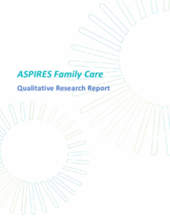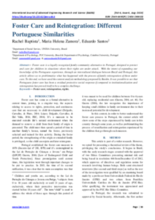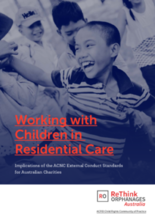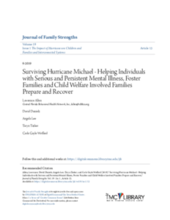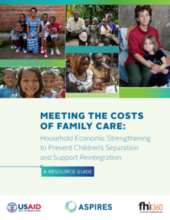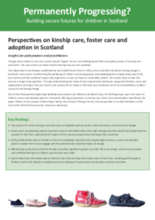Displaying 5681 - 5690 of 14348
The Family Resilience (FARE) project was developed to help build the evidence base on how to appropriately match economic strengthening (ES) activities with families at risk of family-child separation and with families in the process of reintegrating a previously separated child. The project offered an opportunity for learning about how to provide ES and other family strengthening services and how well they worked. This report focuses on the latter and summarizes changes in key indicators related to family-child separation over the course of the project.
In support of the Accelerating Strategies for Practical Innovation & Research in Economic Strengthening (ASPIRES) project's objective to assess the effects of different types of economic strengthening activities integrated with family support activities among targeted families, the Family Care project designed a mixed methods evaluation to be implemented alongside programming. The findings presented in this report are derived from the longitudinal descriptive data generated as part of the evaluation design.
In this qualitative study, attorneys, caseworkers, managers, and service providers from four jurisdictions are interviewed to understand practice and decision-making in reunification case planning and service delivery.
This article examines the family reintegration process for those in care in Portugal and Brazil.
This guidance note was developed by ReThink Orphanages Australia and the ACFID Child Rights Community of Practice to assist charities with overseas activities involving residential care for children in their efforts to comply with the Australian Charities and Not for Profit Commission (ACNC)’s External Conduct Standards (ECS).
This article highlights the experiences of staff who responded to the needs of individuals, families, and communities following Hurricane Michael in Florida, USA in October 2018 and is focused on the perspectives of individuals working in the field.
To help increase the college preparation of local foster youth in a Midwestern city in the US, the authors developed a working group comprised of foster youth nominated by agency staff, staff from a university research center that sponsored and coordinated the program, local community leaders who work with foster youth, and city government representatives.
The Partner Due Diligence Assessment Tool was developed specifically for charities seeking to partner with overseas organisations who provide residential care services for children. It is designed to help you determine whether your partner or prospective partner is operating in accordance with standard notions of good practice and international norms.
This resource guide aims to assist program designers, funders, and implementers to select and incorporate appropriate and effective household economic strengthening (HES) measures into programs to preserve or reestablish family care for children.
Part of the 'Permanently Progressing? Building secure futures for children in Scotland' study, this briefing draws upon the voices of children, carers and adoptive parents in Scotland, offering perspectives on kinship care, foster care and adoption.


